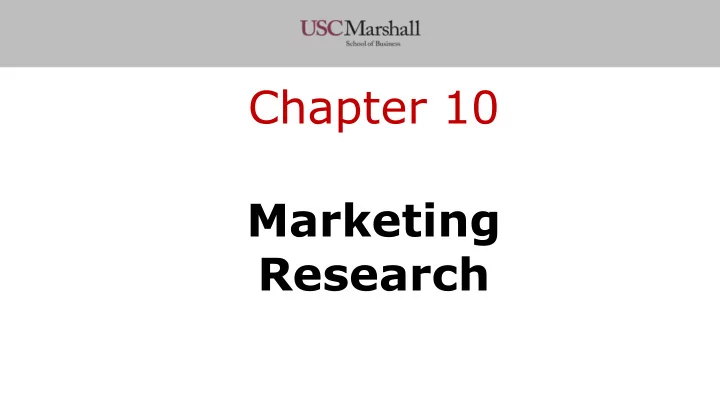

Chapter 10 Marketing Research
Marketing Research DATA Collecting Decision & Analyzing Interpreting Making Storing 2
Why marketing research is important? 1. Better understanding of your customers 2. Knowledge about your competitors 3. Testing your product before launch 4. Business growth 5. … 3
The Marketing Research Process • Always define a direction first! • You’ll notice that these “processes” or “progressions” in your text always begin with a definition of objectives. • Defining objectives leads to more effective use of your resources (funds, talent, etc.) 4
Step 1: Defining the Objectives and Research Needs What exactly are we trying to accomplish (GOAL) with this marketing research project? 1. Which data do you need? 2. How do you obtain this data? 5
Step 1: Defining the Objectives and Research Needs What exactly are we trying to accomplish (GOAL) with this marketing research project? 1. Which data do you need? 2. How do you obtain this data? Example: Movie studios do a lot of research to predict Oscars winners (Think about which data studios would need to do this and how they would obtain it) 6
Step 2: Designing the Research Type of data • Qualitative • Quantitative Type of research to • Over time obtain the data • One instance • … 7
Step 3:Data collection process Types of data Quantitative vs qualitative • Numerical, countable, data • Descriptive data (qualities or • E.g., characteristics) that cannot be • The age of your car measured • The number of files on your PC • E.g., • A TripAdvisor/Yelp review • The color of your car • Images, videos, audios 8
Step 3:Data collection process Types of data We can classify the data depending on: 1. Whether the data is specifically collected for the research ( primary data ) or whether it already exist ( secondary data ) 2. Whether the data is from within the company performing the research ( internal ) or from an external source ( external ) 9
Step 3:Data collection process Types of data Structured vs unstructured data • Generally quantitative • Generally qualitative • Structured data is highly- • To extract information from it organized and formatted we need Machine Learning • Examples: Images, Videos, Audio 10
Step 3:Data collection process Types of data – Cross-sectional data : one observation for every “individual” in the dataset Patient ID Weight Age 1 150 33 2 140 23 3 180 26 4 220 39 5 130 70 6 170 22 – Panel data (or longitudinal data) : repeated observations over time for every “individual” in the dataset 11
Step 3:Data collection process Examples of secondary data – Scanner data (think about store receipts) • Internal and secondary – Syndicated data (not free!) • There are companies specialized in collecting and selling data, e.g., Nielsen or IRI • External and secondary – Census Bureau data , e.g.: • Pct. People with college degree in a zipcode, unemployment rate • External and secondary 12
Step 3:Data collection process Some specific examples Whole Foods – Uses its scanner data to determine shoppers’ favorite brand of sliced bread and make inventory decisions on the basis of their findings. – The data used in this case is secondary and internal . Netflix – Content watched by each user ( secondary and internal ) – Very advanced use of data/data analytics: Machine learning à Netflix • 13
Step 3:Data collection process Collecting primary data 14
Step 3:Data collection process Surveys Structured Please describe your ideal vacation in the space below: Unstructured 15
Step 3:Data collection process Tools to create surveys Useful for the group projects! 16
Step 3:Data collection process Focus groups In person interviews with a small group of consumers Watch this video to learn more about focus groups: https://www.youtube.com/watch?v=3TwgVQIZPsw 17
Step 3:Data collection process Scraping data from websites Essentially scraping consists in downloading html pages from a website and extract information from them For more info: https://www.youtube.com/watch?v=Ct8Gxo8StBU&featur e=emb_rel_pause 18
Step 3:Data collection process Experimental research, e.g., A/B Testing 19
Step 4: Analyzing data and developing insights Converting data into information to explain, predict , and/or evaluate a particular situation. 20
Step 5: Action plan and implementation Executive summary, supplements including tables, figures, etc. 21
Marketing research Two additional activities 1. Video case + 2 questions 2. Data ethics article 22
Recommend
More recommend